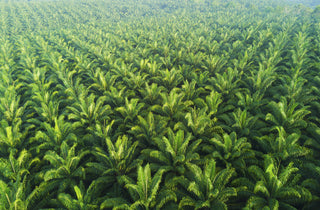This is a big topic with some big opinions to go with it but for the purpose of this blog we’ll keep it short and sweet and let you know where we stand in the debate.
Let’s start with the facts:
What is palm oil?
Palm oil is an edible vegetable oil that comes from the fruit of the Elaeis Guineensis tree. It produces two different types of oil- palm oil which comes directly from the fleshy part of the fruit and palm kernel oil which comes (unsurprisingly) from the kernel. The trees are widely spread in over 42 countries but over 85% of those are in Indonesia and Malaysia.
What is it used for?
Palm oil is a really versatile oil that has many uses in cooking, cosmetics, biofuel and animal feed. Its saturation across these markets makes it almost impossible to avoid.
An eye-opening 50% of all processed foods contain some form of the oil and 70% of cosmetics contain palm oil or its derivatives.
Palm oil is a very efficient crop, in fact it is the highest yielding crop of all vegetable oils producing high quantities of oil over small areas of land. It produces 35% of the worlds vegetable oil over just 10% of land allocated to vegetable crops which makes it a desirable option for farmers compared to other crops such as Rapeseed or Sunflower which both use far more land to yield the same amount of oil.
So what's the problem with it?
Well, we know palm oil is a really efficient crop that produces a high yield of oil, with a low land usage, which has multiple uses across several sectors. Those are all pretty big ticks on the checklist for a sustainable oil ….BUT.... because of this, the demand for the oil has grown substantially. To meet demand vast amounts of bio-diverse land and irreplaceable habitat have been cleared of any existing plants and vegetation (including tropical forests) and in its place are a series of mono-culture palm plantations.
This conversion of land use has affected the valuable eco- system and there has been great loss of critical wildlife habitat. Perhaps the most widely known affected species are the Orangutans.
Around 750 to 1,250 Orangutans are killed each year through human-animal conflicts, brought about by agricultural growth but it's not just one species that's being affected - there are numerous other species affected by palm oil deforestation such as the Sumatran rhinos, Sumatran tigers and Sumatran elephants which are all critically endangered. According to The International Union for Conservation of Nature (IUCN) at least 193 threatened species are directly impacted by palm oil production worldwide.
Palm oil is here to stay...
Palm oil is not going anywhere. It's global usage means that regardless of any negative impact the current production methods are having, people will continue to demand it because of its high yield and low-cost production. It is predicted that Palm oil demand is expected to grow at 1.7% per year until 2050 so more habitat loss is inevitable.
“Things are going to get worse – not a message we like to hear, but denial is no longer an option. Bold action is.”
Sir David Attenborough
This is pretty depressing, isn't there a solution?
Sort of. Environmental activists have historically attempted to drive a full boycott of palm oil to correct the problem, and despite this feeling like the right thing to do, it's just not the answer. Sir David Attenborough said that people should choose certified palm oil over standard production because if we boycott, or ban palm oil production altogether then we will be met with the same issues but with another, lower yielding crop such as sunflower, soy or rapeseed - all of which require a vast amount of land to produce the same amount of oil.
The better solution would be to increase demand for sustainable palm oil.
Sustainable palm oil is therefore the only answer to conventional palm oil. From growers to consumers- we all have the responsibility to make the right choices for the benefit of the planet.
This view is echoed across leading charities such as the ICUN, Greenpeace and the WWF who all state that rather than boycott palm they call for palm oil to be produced more sustainability by avoiding deforestation and cutting non-food palm oil use to reduce its impacts on biodiversity.
OK. That makes sense but why don't you use palm oil then?
For us, the main usage of palm would have been in the production of our cold process soaps and we can't dispute the fact that palm oil and palm kernel oil are pretty good ingredients to use in soap. They create a hard, long-lasting bar with good lather, and a lot of soap makers, like large-scale commercial companies, still rely on these as their main ingredients. But we wanted to see what we could use as alternatives that perhaps balanced the scales on sustainability.
So what were our options?
To create a hard bar of soap that lasts well and doesn't draw up water, you need to use hard fats such as palm, coconut, butters, soy wax, cocoa butter or animal fats like lard or tallow. All of these have their own environmental impact which could be debated over and over (which we did debate over and over actually) but we had to settle eventually on what we felt performed the best, with the least environmental impact that we could justify.
We eventually chose to use Soy wax in our soaps. Its performance was far superior to other test bars and it was not irritating at all to our sensitive skin.
Soy itself is not without a negative environmental impact - it's true that globally soy cultivation has several of the same issues as palm, contributing to deforestation in the Amazon and Brazil, however, the GM-Free soy wax we source is from growers in Europe who are committed to responsible farming and it is deforestation-free.
What we have learnt since starting yearth. is that there is no simple choice. Each ingredient we use has some environmental impact (nothing is without debate).
Ultimately it comes down to finding balance and establishing your morals.
As consumers, if we choose to use palm then we have the responsibility to demand responsibly sourced palm over conventional palm and the more of us that do this, the better. After all, we are stronger when we stand together, and changes in the world can only happen when we first decide to change within ourselves.



